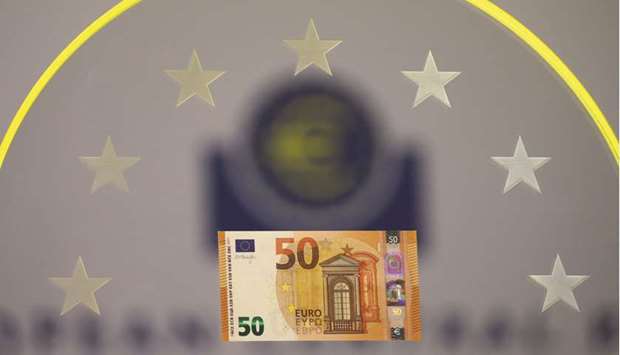The euro stemmed a decade-long slide in its international usage to see a pickup last year as geopolitical tensions damped demand for the dollar, according to the European Central Bank.
The single currency accounted for almost 21% of global foreign-exchange reserves in 2018, up more than a percentage point from previously, the ECB said in its annual report on the international role of the euro. While the dollar accounted for almost 62%, that’s the lowest since the start of European monetary union two decades ago.
“Financial turbulence in some emerging market economies, growing concerns about the impact of international trade tensions and challenges to multilateralism, including the imposition of unilateral sanctions, seem to have lent support to the euro’s global standing,” the report said.
The dominance of the dollar has been highlighted by the policies of President Donald Trump, as trade tensions increase and issues such as sanctions on Iran limit the European Union’s room to pursue foreign objectives. The geopolitical strains flared up again this week as Trump threatened sanctions over German support for a gas pipeline from Russia and warned he could shift troops away from the Nato ally over its defence spending.
European Commission President Jean-Claude Juncker last year said it is “absurd” that the EU pays 80% of its energy bill in the US currency even though only a fraction of those imports come from the nation.
Bank of France governor Francois Villeroy de Galhau – one of the contenders to become the next ECB president – signalled recently that the eurozone’s central bank might take a more active role in trying to increase the use of the euro in international transactions. He said the dollar gives the US a clear advantage in the exercise of power.
The report doesn’t go that far. President Mario Draghi said in a foreword that making economic and monetary union “deeper and more complete” – for example by creating a capital markets union – would help boost the role of the euro. He noted that the euro’s usage also increased in international debt issuance and deposits, but was “broadly stable” as an invoicing currency.
Draghi’s Executive Board colleague Benoit Coeure – another contender to succeed him – told reporters that it’s too soon to say that the euro is on a longer-term trend of wider use.
“What we see here is a blip – what you see in 2018, 2019 is primarily the diversification out of the US dollar, which primarily benefits the euro because the euro is there being the second-most used currency and second-most liquid investment universe,” he said. “Concerns about unilateral sanctions by the US probably added to rebalancing of foreign exchange portfolios.”
Coeure added that the ECB now sees more benefits than costs to the euro as an international currency, but the central bank shouldn’t be pushing for its global use.
“It doesn’t imply that the ECB should have an active policy of promoting the international role of the euro because most of the drivers are outside of monetary policy,” he said. “That’s not something that we can control. We strongly believe that international role of the euro should remain driven by market forces.”

A specimen of the 50 euro banknote is pictured at the ECB headquarters in Frankfurt (file). The single currency accounted for almost 21% of global foreign-exchange reserves in 2018, up more than a percentage point from previously, the ECB said in its annual report on the international role of the euro.
